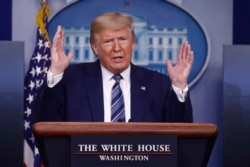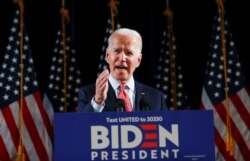November’s U.S. national presidential election is now set: President Donald Trump against former Vice President Joe Biden.
The sudden certainty emerged Wednesday as Vermont Sen. Bernie Sanders, a self-described democratic socialist, suspended his campaign for the Democratic presidential nomination. He faced dwindling odds against Biden, who is making his third run for the presidency over three decades.
Speaking from his home in the northeastern U.S., Sanders called Biden “a very decent man” and said he would work with him on “progressive ideals.”
Sanders said that while he was suspending his active campaign, he would remain on the ballot in states that have yet to stage Democratic presidential primary elections.
Sanders hopes the decision to stay on the ballot will help him win more pledged delegates to the party’s national convention in August, which would give him a voice in the writing of the party’s policy platform.
Sanders has championed a government takeover of health care in the U.S., which Biden opposes, and other spending that would greatly expand the welfare state in the country, like that seen in Scandinavia.
After the convention, Sanders said he would work with Biden to defeat Trump, whom Sanders called “the most dangerous president in modern American history.”
Biden issued a statement commending Sanders, saying he not only had run a political campaign but “created a movement” that, along with his supporters, “changed the dialogue in America.”
“It’s voices like Bernie’s that refuse to allow us to just accept what is — that refuse to accept we can’t change what’s wrong in our nation — that refuse to accept the health and well-being of our fellow citizens and our planet isn’t our responsibility too,” Biden said. “Bernie gets a lot of credit for his passionate advocacy for the issues he cares about. But he doesn’t get enough credit for being a voice that forces us all to take a hard look in the mirror and ask if we’ve done enough.”
Biden also reached out to Sanders’ supporters, saying he hoped they would join those backing the former vice president.
At the moment, however, the U.S. presidential campaign has all but disappeared from the consciousness of Americans who are uniformly focused on trying to avoid the deadly coronavirus and worried about the fate of their jobs as the pandemic wreaks mayhem on the U.S. economy.
The November 3 election now pits two septuagenarians against each other — Trump, 73, and Biden, 77 — even as much younger candidates vied with Biden and lost. Trump’s renomination by Republicans for a second term has never been in doubt.
The two candidates will present voters with a sharp contrast.
During his time in the White House, Trump has advanced an agenda of disrupting official life in Washington, attempting to “drain the swamp,” as he often says.
He has advanced conservative policies and appointed dozens of conservative judges to lifetime appointments that will shape the country’s legal framework for decades.
He embraced cuts in government spending until recently, when the coronavirus pandemic led to an abrupt about-face, as he wholeheartedly supported a $2 trillion rescue package, with more spending to save the U.S. economy, the world’s largest, in the immediate offing.
Biden, who served for eight years as former President Barack Obama’s second-in-command from 2009 to 2017, espouses left-of-center political views, more agreeable to government assistance for the less well-off than Trump has proven to be.
Biden has called for improvements in the national health care plan adopted in 2010, popularly known as Obamacare, but not its demise as Trump has sought, or its replacement with a government plan as Sanders advanced.
Biden has said he will name a woman as his running mate, which would be the third such time that has occurred in U.S. political history.






